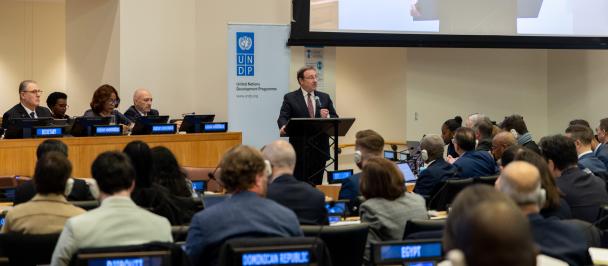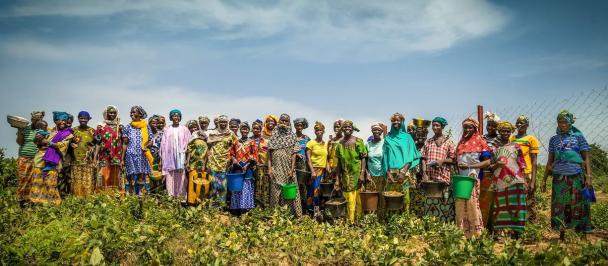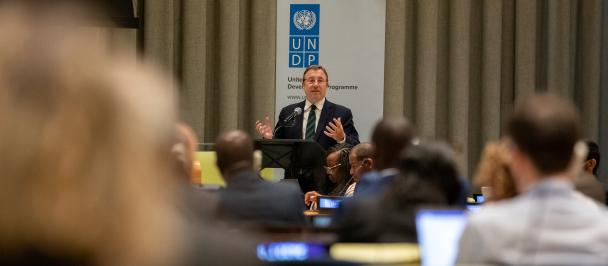Remarks at Annual Ministerial Meeting of Foreign Ministers of the Group of Landlocked Developing Countries
Annual Ministerial Meeting of Foreign Ministers of the Group of Landlocked Developing Countries
September 28, 2018
As prepared for delivery.
Excellencies,
Ladies and gentlemen,
I am pleased to be here today to underline the importance UNDP attaches to the cause of the Land-locked developing countries (LLDCs).
The LLDCs are a heterogeneous group of countries located across four continents. But they share a geographical condition which poses common challenges to sustainable development requiring the special attention of the international community as recognized in the 2030 Agenda and other international frameworks, notably the Vienna Programme of Action for LLDCs.
UNDP is fully invested in working with partner countries, including the LLDCs, in finding pathways towards sustainable development, to eradicate poverty, reduce inequality and protect the environment for future generations.
In collaboration with other UN agencies and international organizations since 2016, UNDP has facilitated engagement with at least 12 LLDCs to mainstream the SDGs in national development policies, action plans and budgets; identifying integrated policy approaches susceptible to accelerate progress across the SDGs; discussing innovative financial mechanisms to mobilize resources to invest in sustainable development; and reviewing data and capacity of national statistical systems for the review and follow up of the 2030 Agenda, among others.
In Burkina Faso, for instance, the resulting Roadmap for the implementation of the SDGs, stressed the importance of more inclusive growth through accelerated transformation of the agriculture and pastoralist sectors where most of the population is engaged. To underpin such transformation, access to energy, particularly renewable energy was underscored as a key driver for progress towards the SDGs. The Roadmap places the need for structural economic transformation within a broader context, calling attention to the need for sustainable management of natural resources, as well as governance reforms and stronger linkages between humanitarian and development efforts.
In Armenia, the SDG Roadmap calls attention to the importance of growing trade and investment connections to promote a more diversified economy, that generates livelihood and employment opportunities for youth. Enhancing ICT connectivity and developing the services sector can contribute to address the challenges of isolation and high trade costs resulting from Armenia’s geographical condition. These measures complement suggested actions around governance reform, environmental stewardship and development of human capital, including gender equality as reflected in the SDG Roadmap. Moreover, the Government of Armenia and the UN have established an Innovation Lab to leverage innovation towards SDG achievement. The Lab will draw upon innovative methodologies and expertise available from across the world including UN’s own tools and resources.
In Mongolia, UNDP along with UNFPA, UNICEF and the Asian Development Bank suggested integrated actions to address air pollution, land degradation, and implications of demographic trends on public expenditures and service provision. UNDP is also supporting the government to mainstream the SDGs within the government budget, focusing on the health sector. Using an innovative SDG interactions’ mapping methodology, UNDP further supported the National Development Agency to bring together sector ministries to map interactions between the SDGs related to key economic sectors – agriculture, water, tourism, and light industry. The SDGs interactions’ mapping helped identify synergies and trade-offs between policies and support an approach to integrated decision making aligned with “the whole of government” and “whole of society” principles of the 2030 Agenda.
UNDP’s partnership with LLDCs covers specific priority areas of the Vienna Programme of Action, including for example, energy.
At UNDP we have provided renewed impetus to our work on access to energy considering the beneficial effect it has across SDGs such as health, education, infrastructure and sustainable industrialization. Energy has been identified as one of the six thematic priorities in UNDP’s Strategic Plan with a signature solution seeking to close the energy access gap. Our support focuses on both access to energy and access to clean cooking solutions. Programmes are on-going in 9 landlocked developing countries.
These examples illustrate the strong interconnections between the UN and UNDP’s support to the implementation of the SDGs and the Vienna Programme of Action for the LLDCs, at country level.
I want to conclude by congratulating the LLDC Governments for the establishment of the International think-tank for the LLDCs as a full- fledged international organization. At UNDP we are proud to have been associated with this initiative since its inception. I am confident the International think-tank will produce analytical work and provide a platform for concerted action by the LLDCs in the international fora and in cooperation with the UN to address their particular development challenges and contribute to the progress of the Vienna Programme of Action.

 Locations
Locations


